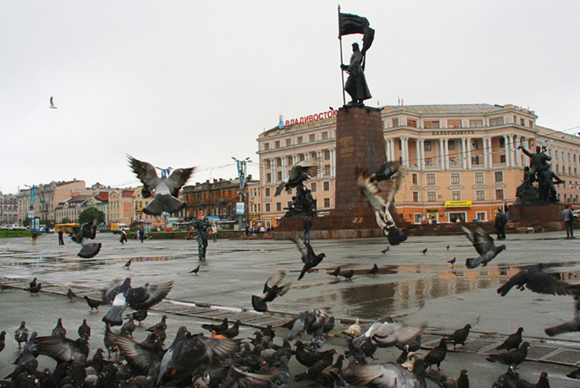Russia eyes cooperation with APEC
 0 Comment(s)
0 Comment(s) Print
Print E-mail China.org.cn, September 3, 2012
E-mail China.org.cn, September 3, 2012
Russia is seeking to further develop the mutually beneficial cooperation with partners of the Asia-Pacific Economic Cooperation (APEC), a senior Russian official said.
|
The 2012 Asia-Pacific Economic Cooperation (APEC) forum opened in Vladivostok, Russia, on Set. 2, 2012. It is the first time for Russia to host the 21-economy gathering. |
"We have big hopes for further cooperation with our APEC partners in the implementation of a number of projects," Viktor Ishayev, Minister for the Development of the Russian Far East, said in an interview with Xinhua on the eve of the APEC summit, which is to be held in Russia's Far East city Vladivostok from Sept. 8 to 9.
Ishayev highlighted APEC's role in the global economy, saying the bloc, comprising some of the most dynamic and robust economies in the world, accounts for over half of the global economic output and 48 percent of its total trade.
"Unlike the crisis-shaken Europe, the Asian-Pacific region has developed rapidly, and the APEC economies, including China, are our important economic and political partners," the minister said.
Ishayev said Vladivostok was named as the APEC host city on strategic consideration, since the Far East is the core region for Russia's economic integration with other APEC members.
However, Ishayev was not satisfied with the foreign investment the region has so far attracted from APEC members, which only accounted for 16 percent of total money inflow into Russia last year.
Ishayev reiterated Russia's commitment to the development of the Far East, which was expected to become a Russian hub in Asia Pacific.
"Key transport and energy infrastructures, enterprises of various sectors and social projects are being developed in that region," Ishayev said, adding his newly-established post serves to step up that work.
The minister said there are still rooms for Russia and APEC partners to promote cooperation in the Far East, especially in manufacturing and high value-added products.
Cooperation also lies in tourism, services, financial industry and joint-ventured projects, including the reconstruction of the Trans-Korean railway, the building of gas pipeline to South Korea, the ongoing construction of the Baikal-Amur railway and the development of sea port infrastructure, he added.
Highly praising the long preserved Russia-China ties, Ishayev said the two countries would hopefully increase trade volume to new levels set by Russian President Vladimir Putin and his Chinese counterpart Hu Jintao this June -- US$100 billion in 2015 and 200 billion dollars in 2020.
Russia and China should strengthen efforts to deepen bilateral cooperation, Ishayev said.






